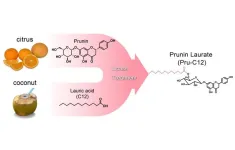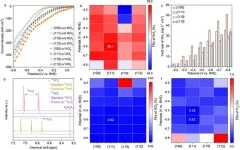(Press-News.org) London, United Kingdom – 28 August 2024: New research presented at this year’s ESC Congress 2024 in London, UK (30 Aug – 2 Sept) shows that, among patients admitted to the intensive cardiac care unit (ICCU), those with a recent history of recreational drug use are three times more likely than those with no history to experience a repeat serious cardiovascular event within one year.
“Among patients admitted to the intensive cardiac care unit (ICCU), systematic screening for recreational drugs evidenced a significant prevalence – 11% - of recent use,” said study author Dr Raphael Mirailles, Hospital Lariboisiere, Paris, France. “Recreational drug use was associated with triple the risk of a repeat serious cardiovascular event within one year.”
Previous work by the same group showed that this recent history of recreational drug use was associated with a higher rate in-hospital outcomes. However, long-term cardiovascular consequences of recreational drug use remain uncertain.
In this study the authors aimed to evaluate the prognostic impact of recreational drugs use at 1-year follow-up to predict serious cardiovascular events (including death) in consecutive patients admitted to ICCUs for acute cardiovascular events from the Addiction in Intensive Cardiac Care Units (ADDICT-ICCU) study.
All consecutive patients admitted to ICCUs over two weeks in April 2021 at 39 centres across France were included. Screening for recreational drugs use was performed by systematic urinary testing. All patients provided written informed consent for participation and therefore approved urinary testing. One-year follow-up consisted of a clinical visit or direct contact with the patient and the referring cardiologist. The primary composite outcome was the occurrence of a serious cardiac event - cardiovascular death, non-fatal heart attack (MI) or stroke. Subgroup analysis was performed in patients hospitalised at baseline for acute coronary syndrome (non-fatal heart attack / angina lasting more than 20 minutes).
Of the 1499 consecutive patients screened, 1392 (93%) patients (mean age 63 years, 70% males) had a complete 1-year follow-up. Among them, 157 (11%) had an initial positive test for recreational drug use (cannabis, opioids, cocaine, amphetamines, 3,4-methylenedioxymethamphetamine [MDMA]). Among these positive results the following drugs were found: cannabis: n=136, 9.8%; heroin and other opioids: n=32, 2.3%; cocaine: n=23, 1.7%; amphetamines: n=9, 0.6% MDMA (active ingredient of ecstacy: n=9, 0.6%). More than one quarter of patients (n=45, 28.7%) tested positive for two or more of these drugs.
The test deployed for each drug simply provided a positive or negative result, but the amount required to give a positive test was substantial. The urine drug assay that was used continues to be positive 2 to 6 days after substance use, therefore it shows mainly recent exposure rather than regular use. On the other hand, an increase in major adverse events at one year might indicate chronic use.
After 1-year of follow-up, 94 (7%) patients experienced a serious cardiovascular event (including death). Patients with positive testing exhibited a higher rate of serious cardiovascular events than non-users (13% vs 6%, respectively, a statistically significant finding). The data were then adjusted for multiple factors – including age, sex, diabetes, current smoking status, history of cardiovascular disease before hospitalisation, known chronic kidney disease, history of cancer, the main admission diagnosis, baseline systolic blood pressure, and baseline heart rate. Following this adjustment recreational drug use was independently associated with a three times higher risk of serious cardiovascular events.
ln the subgroup analysis of 713 patients hospitalised at baseline for acute coronary syndrome, 96 (14%) had a positive recreational drug test and 50 (7%) experienced serious cardiovascular events. Using computer modelling in this population, recreational drug use was still independently associated with a three times higher risk of serious cardiovascular events after adjustment for traditional prognosticators.
Among the 1392 patients screened, there were 64 (4.6%) cardiovascular deaths, 55 (4.5%) among non-users and 9 (5.7%) among recreational drugs users. Considering heart attack, there were 24 (1.7%) non-fatal heart attacks overall, 16 (1.3%) among non-users and 8 (5.1%) among drug users. Considering stroke, there were 10 (0.7%) strokes, and 7(0.6%) for non-users and 3 (1.9%) for drug users.
Among recreational drugs tested, MDMA (4.1 times increased risk), heroin and other opioids (3.6 times) and cannabis (1.8 times) were significantly associated with serious cardiovascular events. The other drug types did not have a statistically significant relationship with serious cardiovascular events.
Dr Mirailles said: “ln a large cohort of consecutive patients admitted to intensive care cardiac units for acute cardiovascular events, the prevalence of recreational drug use was 11%. Recreational drug use was associated with a tripling of the risk of a repeat serious cardiovascular event within one-year.”
He added: “There is an increasing amount of data regarding worst prognosis associated with recreational drug use, not only in cardiac intensive care units but also in conventional intensive care units. Despite high rate of underreporting of recreational drug use, systematic screening is not recommended by the current guidelines. It might improve risk stratification of patients and personalised care to favour drug withdrawal. Therefore, systemic screening should be considered in intensive care.”
ENDS
Notes to editors
Funding: Institutional grant from the ‘Fondation Coeur et Recherche’, Paris, France.
Disclosures: The authors declare no conflicts of interest.
References and notes
The abstract ‘Recreational drugs use as prognostic factor of major adverse cardiovascular and cerebrovascular events in patients hospitalised for acute cardiovascular events’ will be presented at the session The best acute cardiovascular-care science which takes place on Saturday 31 August at 13:15 to 14:15 BST at Science Box 1 - Research Gateway
ESC Press Office
Tel: +33 6 61 40 18 84
Email: press@escardio.org
The hashtag for ESC Congress 2024 is #ESCCongress
Follow us on X @ESCardioNews
Journalists are invited to become accredited and register here.
Check out the ESC Media and Embargo Policy.
About ESC Congress 2024
It is the world’s largest gathering of cardiovascular professionals, disseminating ground-breaking science both onsite in London and online – from 30 August to 2 September. Explore the scientific programme. More information is available from the ESC Press Office at press@escardio.org.
About the European Society of Cardiology
The European Society of Cardiology brings together health care professionals from more than 150 countries, working to advance cardiovascular medicine and help people lead longer, healthier lives.
END
Recent recreational drug use triples risk of repeat serious cardiovascular event
Patients with recent history of recreational drug use admitted to intensive care cardiac unit have triple the risk of a repeat serious cardiac event within one year
2024-08-28
ELSE PRESS RELEASES FROM THIS DATE:
Bats are surviving and thriving on nothing but sugar
2024-08-28
KANSAS CITY, MO—August 28, 2024—Humans must regulate blood sugar concentrations to stay healthy and to fuel our cells. Too little or too much can cause serious health complications, and high blood sugar is a hallmark of the metabolic condition, diabetes. New research from the Stowers Institute for Medical Research may enable potential solutions to metabolic disease by turning to evolution and to bats.
Recently published in Nature Ecology and Evolution on August 28, 2024, the study led by co-first authors Postdoctoral Research Associate Jasmin Camacho, Ph.D., and former Stowers researcher Andrea Bernal-Rivera from the lab of Stowers ...
Researchers develop novel organic redox-active molecules for flow batteries
2024-08-28
Organic redox-active molecules (ORAMs) are abundant and diverse, offering significant potential for cost-effective and sustainable energy storage, particularly in aqueous organic flow batteries (AOFBs). However, ensuring the stability of the ORAMs during the charge and discharge process is critical, as side reactions can deactivate them and eliminate their redox activity. Air stability remains a challenge for many ORAMs, complicating their practical use.
Recently, a research group led by Prof. LI Xianfeng and Prof. ZHANG Changkun from ...
Study finds limits to storing CO2 underground to combat climate change
2024-08-28
Imperial College London press release
Under strict embargo until:
Wednesday 28 August 2024
10am UK time/5am Eastern
Study finds limits to storing CO2 underground to combat climate change
Imperial research has found limits to how quickly we can scale up technology to store gigatonnes of carbon dioxide under the Earth’s surface.
Current international scenarios for limiting global warming to less than 1.5 degrees by the end of the century rely on technologies that remove carbon dioxide (CO2) from the Earth’s atmosphere faster than humans release it. This means removing ...
Pain identified as dominant symptom in long Covid
2024-08-28
Pain may be the most prevalent and severe symptom reported by individuals with long Covid, according to a new study led by UCL (University College London) researchers.
The study, published in JRSM Open, analysed data from over 1,000 people in England and Wales who logged their symptoms on an app between November 2020 and March 2022.
Pain, including headache, joint pain and stomach pain, was the most common symptom, reported by 26.5% of participants.
The other most common symptoms were neuropsychological ...
What role did fear play in Europe's population growth?
2024-08-28
[Vienna, August 26 2024] – Since the end of the last Ice Age, growth of human population was far from uniform, marked instead by periods of rapid expansion followed by sharp declines. The reasons behind these fluctuations remain only partially understood. Previous research by CSH scientists Peter Turchin, Daniel Kondor, and an international team of collaborators, demonstrated that social conflicts, rather than – or in addition to – environmental factors, could have significantly impacted these patterns. Now, they add another piece to the puzzle.
Wars and conflicts not only cause direct casualties but also create an atmosphere of distress ...
Shot of confidence: Building trust in vaccination programs
2024-08-28
A new paper in the Journal of Public Health, published by Oxford University Press, finds that highlighting the harms of not getting vaccinated is a more effective message than emphasizing the benefits of vaccination for individual patients or the benefits to public health.
Vaccination remains the most economical and effective public health strategy for reducing morbidity and mortality. But some vaccines, such as those for flu, pneumonia and HPV, are given voluntarily. Often due to misinformation or ignorance many people are reluctant to get vaccinated for various diseases (or to vaccinate their children). For years researchers have been investigating various strategies ...
Protect your teeth with fruit: antimicrobial effects found in biomass compounds
2024-08-28
Periodontal disease is an inflammatory disease caused by a periodontal pathogenic bacteria infection that affects oral and internal health. Good oral care is essential for prevention, but most over-the-counter oral hygiene products are disinfectants that can be highly irritating. This makes them unsuitable for use by young children and the elderly, who are susceptible to periodontal disease.
To find an antibacterial that is easy to use and effective in preventing periodontal disease at all ages, Professor Shigeki Kamitani of Osaka Metropolitan University’s Graduate School of Human Life and Ecology led a research team in verifying the antibacterial effect of seven ...
AI tools like ChatGPT popular among students who struggle with concentration and attention
2024-08-28
Since their release, AI tools like ChatGPT have had a huge impact on content creation. In schools and universities, a debate about whether these tools should be allowed or prohibited is ongoing.
Now, researchers in Sweden have investigated the relationship between adolescents’ EF and their use and perceived usefulness of generative AI chatbots for schoolwork. They published their results in Frontiers in Artificial Intelligence.
“Students with more EF challenges found these tools particularly useful, especially for completing assignments,” said Johan Klarin, a school psychologist and research assistant at the Department of Psychology ...
Insights into spinel cobalt oxides may lead to efficient ammonia synthesis
2024-08-28
Researchers have made a significant breakthrough in the development of catalysts for the electrochemical nitrate reduction reaction (eNO₃RR) to ammonia, a process that has broad implications for sustainable energy, agriculture, and industrial applications.
Ammonia, a critical component in global food production, also holds promise as a zero-carbon fuel due to its high energy density, clean combustion products, and established infrastructure for storage and transportation. However, the current method of producing ...
U of A College of Nursing receives $1.6M grant to support Indigenous students
2024-08-28
Indigenous students pursuing nursing careers at the University of Arizona College of Nursing will benefit from additional financial support thanks to a $1.6 million grant from the U.S. Department of Health and Human Services’ Indian Health Service.
The grant will fund the successful Indians in Nursing: Career Advancement and Transition Scholars, or INCATS, program for another five years. The program provides Indigenous students at the U of A College of Nursing with financial support for tuition, fees and a living stipend.
Additionally, the grant provides resources for dedicated time and personnel to partner with tribal ...
LAST 30 PRESS RELEASES:
Scientists show how to predict world’s deadly scorpion hotspots
ASU researchers to lead AAAS panel on water insecurity in the United States
ASU professor Anne Stone to present at AAAS Conference in Phoenix on ancient origins of modern disease
Proposals for exploring viruses and skin as the next experimental quantum frontiers share US$30,000 science award
ASU researchers showcase scalable tech solutions for older adults living alone with cognitive decline at AAAS 2026
Scientists identify smooth regional trends in fruit fly survival strategies
Antipathy toward snakes? Your parents likely talked you into that at an early age
Sylvester Cancer Tip Sheet for Feb. 2026
Online exposure to medical misinformation concentrated among older adults
Telehealth improves access to genetic services for adult survivors of childhood cancers
Outdated mortality benchmarks risk missing early signs of famine and delay recognizing mass starvation
Newly discovered bacterium converts carbon dioxide into chemicals using electricity
Flipping and reversing mini-proteins could improve disease treatment
Scientists reveal major hidden source of atmospheric nitrogen pollution in fragile lake basin
Biochar emerges as a powerful tool for soil carbon neutrality and climate mitigation
Tiny cell messengers show big promise for safer protein and gene delivery
AMS releases statement regarding the decision to rescind EPA’s 2009 Endangerment Finding
Parents’ alcohol and drug use influences their children’s consumption, research shows
Modular assembly of chiral nitrogen-bridged rings achieved by palladium-catalyzed diastereoselective and enantioselective cascade cyclization reactions
Promoting civic engagement
AMS Science Preview: Hurricane slowdown, school snow days
Deforestation in the Amazon raises the surface temperature by 3 °C during the dry season
Model more accurately maps the impact of frost on corn crops
How did humans develop sharp vision? Lab-grown retinas show likely answer
Sour grapes? Taste, experience of sour foods depends on individual consumer
At AAAS, professor Krystal Tsosie argues the future of science must be Indigenous-led
From the lab to the living room: Decoding Parkinson’s patients movements in the real world
Research advances in porous materials, as highlighted in the 2025 Nobel Prize in Chemistry
Sally C. Morton, executive vice president of ASU Knowledge Enterprise, presents a bold and practical framework for moving research from discovery to real-world impact
Biochemical parameters in patients with diabetic nephropathy versus individuals with diabetes alone, non-diabetic nephropathy, and healthy controls
[Press-News.org] Recent recreational drug use triples risk of repeat serious cardiovascular eventPatients with recent history of recreational drug use admitted to intensive care cardiac unit have triple the risk of a repeat serious cardiac event within one year





